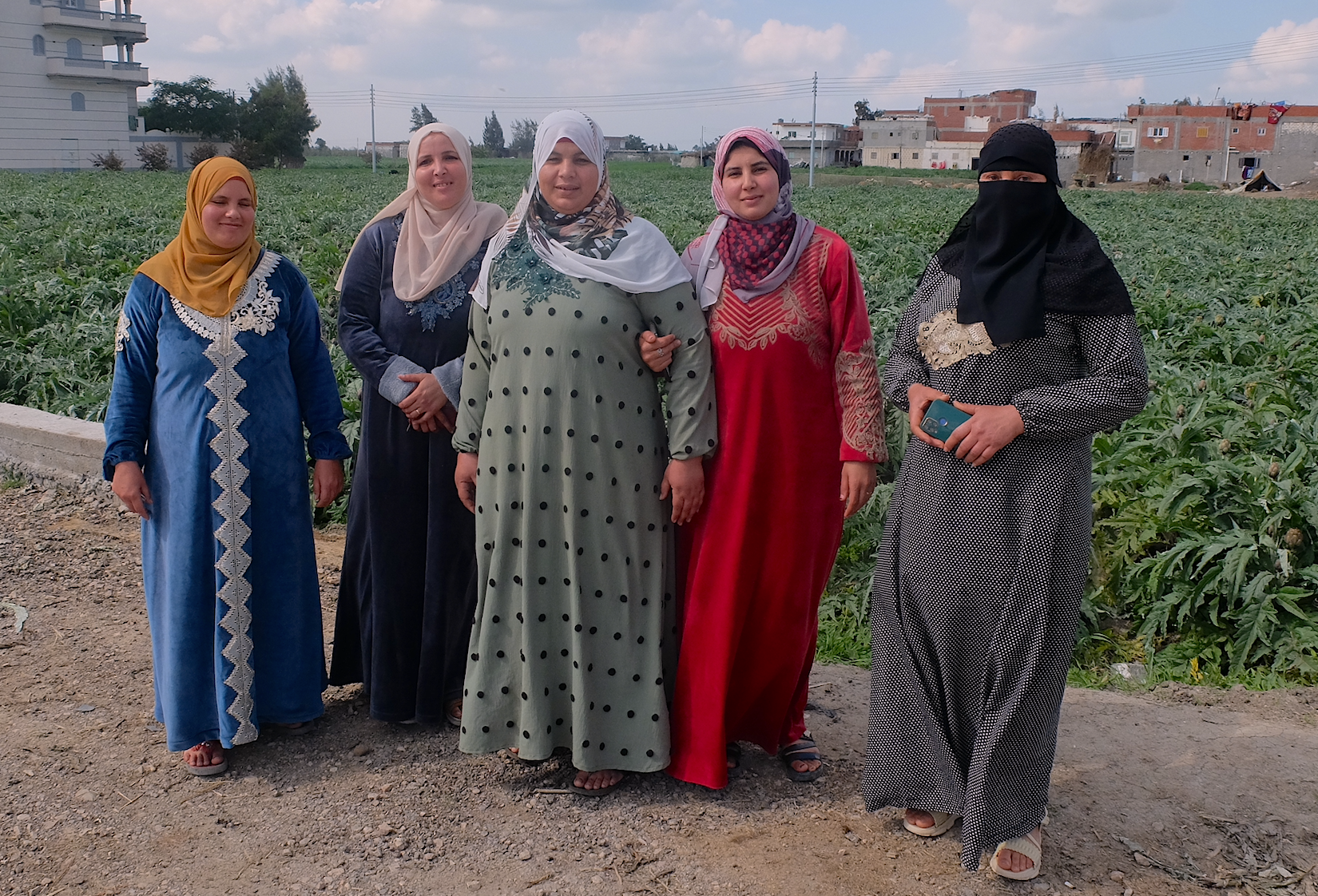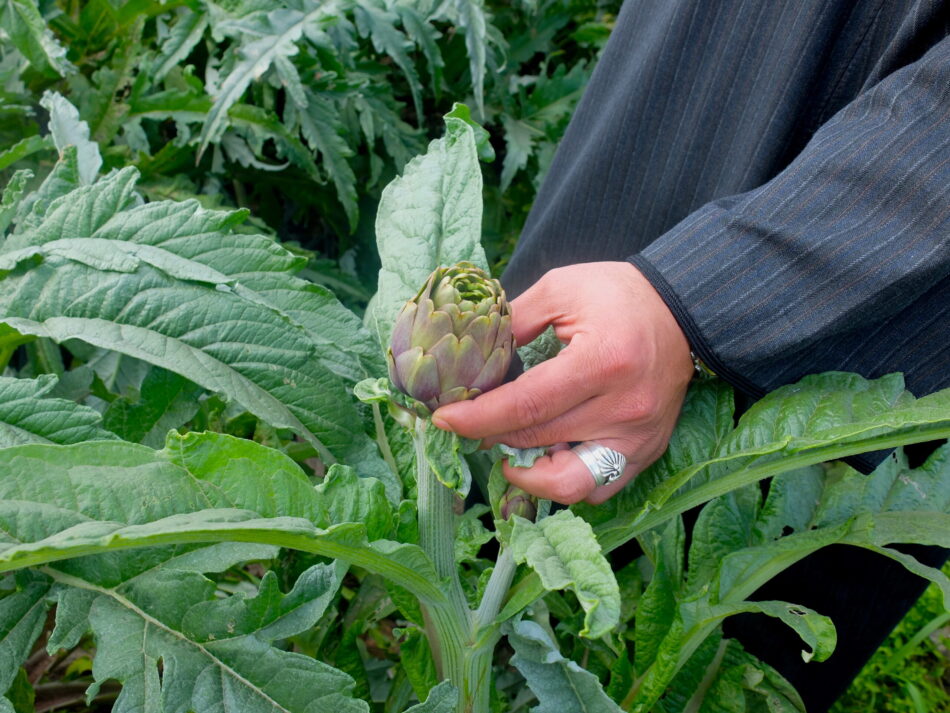By Noura Abdelwahab & Louise Sarant

Izbat Al-Hamra, home to 25,000 residents, is located 25 kilometers inland from Alexandria in the Beheira governorate, a historical center for food production in the western part of the Nile Delta. The governorate is especially famous for its artichoke production, a profitable crop, requiring sufficiently abundant water of decent quality as found near the head of the Izbat Al-Hamra’s main canal. Farmers with land at the tail-end of meskas (tertiary canals) struggle with rising salinity and inconsistent access to water.
To build climate resilience through enhanced water security in the MENA region, IWMI is fostering the adoption of resilient nature-based water solutions for Egypt, Jordan, Lebanon and the Occupied Palestinian Territories through the Al Murunah project, funded by the UK Foreign, Commonwealth and Development Office (FCDO). ‘Al Murunah,’ meaning ‘Flexibility’ in Arabic, deploys tailored sets of interventions based on each context’s soil quality, water profile, climate, and market characteristics. In Izbat Al-Hamra, the project addresses the three intertwined challenges of water scarcity, quality, and salinity through ideal crop choices and training on sustainable agriculture and irrigation. However, Al Murunah’s ambition goes beyond strictly economic interventions; it also tackles social and cultural norms that currently restrict the empowerment of women and youth.

Cleaning artichokes to keep the household afloat
In Izbat Al-Hamra, most of the population, irrespective of gender, is involved in agricultural work. Despite their significant contributions, rural women’s work is often unrecognized and poorly remunerated, unlike their male counterparts who own the vast majority of land and hold official positions within the agriculture cooperative and water users’ association.
“These women are so busy,” says Noura Abdelwahab, who leads the gender component of Al Murunah. “They wake up before dawn, care for their children and the older family members who live with them, feed the animals, help out their husbands on the farm, and manufacture butter, ghee, or cheese to feed the family or sell outside for extra income.”
Despite their hectic schedules, many women also manage to squeeze in some hours at Nawalla, the local artichoke pre-processing factory. Located directly across the main canal, the factory is a large outdoor area sheltered from the sun by a tarpaulin roof and flanked by a dark green artichoke field.
Inside, equipped with sharp knives and plastic buckets, women clean, cut, and trim thousands of artichoke buds that are then soaked in barrels of salt or citric acid before being transported to the processing plant and exported or funneled to the domestic market, where demand is tepid due to artichokes’ high price and the crop’s relative absence from Egyptian culinary traditions.
“We are paid on Thursdays, based on the number of artichokes we trimmed during the week,” says Naima Abdelaziz Mohamed, a 30-year-old Izbat Al-Hamra resident and mother of three who explains that having this flexibility is key. “A few years ago, we were able to save up and invest in chickens, ducks, or even cattle,” explains Ghada Mahmoud Mohamed, who works at Nawalla with Naima. “That’s over. We now spend that money on essential, immediate needs,” she explains.
More responsibility – at what cost?
In Egypt, residents in rural areas experience higher rates of poverty, unemployment, early marriage, illiteracy, and gender-based violence than in cities. Rural women are disproportionately affected and face a range of challenges, from systemic barriers that limit their access to land and asset ownership to cultural pressures that require them to perform unpaid labor while being largely excluded from decision-making and leadership roles.
Although women have been taking up more responsibilities in farming and irrigation as many men have migrated to cities or the Gulf States for work, this additional workload has not granted them greater economic benefits and representation.
To foster positive change, Noura is leading the creation of a pioneering community space in Izbat Al-Hamra. Known as the Ishrakah Club (‘Sunrise Club’), this space will serve as a safe and supportive environment for local women and youth, facilitating their economic empowerment.
“We have set a new gender ambition for the Al-Murunah project: to be the first in the MENA region to empower entire families. Women and youth will benefit from economic and social interventions, while men will be trained on comprehensive resilient nature-based water solutions,” she explains.
A new dawn for the women of Izbat Al-Hamra
The new space will be located in the agricultural cooperative of Izbat Al-Hamra, which is in the village center and easily accessible on foot. Ishrakah’s primary goal is to enhance women’s capacity to establish small businesses, either individually or collectively. “As men cultivate artichokes, their wives could set up their own artichoke processing unit or receive training on organic compost and fertilizers, potentially deciding to become traders,” Noura suggests. She emphasizes that the new community center will grant women access to the support they need to start and grow their businesses, from microfinance instruments to counsel from advisory services and training and links to markets.
There is still a wide evidence gap across the MENA region and crisis settings on the effects of combined economic and social interventions to reduce gender-based violence, explains Morag Patrick, the Social Development Adviser for MENA Regional Department at and FCDO. “With our partners, FCDO has started implementing this type of intervention in rural Syria, and we plan to share our knowledge and expertise with Al-Murunah as it sets up the Ishrakah Club,” she points out.
With the Ishrakah Club, IWMI’s Al Murunah project is poised to make a significant impact on the lives of rural women in Egypt, providing them with the support and resources they need to thrive and succeed in the agricultural sector, ultimately contributing to improved water resources management and sustainable development.


